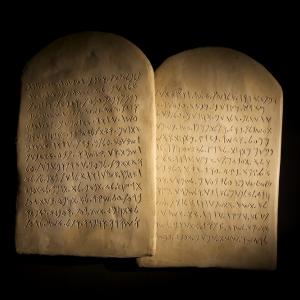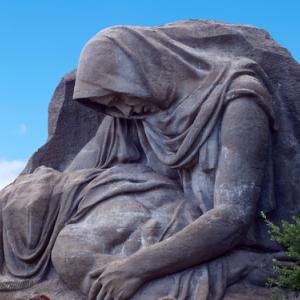
Kimberly Dawn Russaw is a doctoral candidate at Vanderbilt University studying the Old Testament/Hebrew Bible and Ancient Israel. She is an active member of both the Society of Biblical Literature and the American Academy of Religion, and has presented and published in numerous scholarly and ecclesial contexts.
Posts By This Author
The Sacrifice of Covenant Relationship
On any given Saturday, people join Habitat for Humanity teams and commit to work to help eradicate poverty housing. The individual volunteers give of their time, energy and physical ability because they want to be a part of something bigger than themselves. Similarly, in the HBO TV drama “Game of Thrones,” individuals from the fictional continents of Westeros and Essos volunteer to serve as The Night’s Watch. Members of The Night’s Watch live as a self-sufficient military order that defends the Wall that protects the Seven Kingdoms and patrols the Haunted Forest. The Night’s Watch oath details the sacrifice of its members:
"Night gathers, and now my watch begins. It shall not end until my death. I shall take no wife, hold no lands, father no children. I shall wear no crowns and win no glory. I shall live and die at my post. I am the sword in the darkness. I am the watcher on the walls. I am the shield that guards the realms of men. I pledge my life and honor to the Night's Watch, for this night and all the nights to come."
Although the members of The Night’s Watch are fictitious, they exist in a recognizable bond – a commitment that theologians call a covenant relationship.
In the Book of Exodus, readers find the beginnings of the formalized covenant relationship between the Israelites and their god.
ON Scripture: Acknowledging our Divine Positioning
When confronted with the uncomfortable presence of so many relegated to the social margins of our society, we tend to shrink inward lest the enormity of life’s injustices overwhelm us. When we hear of another shooting, we heighten our vigilance with our own kids. We do not allow them to take public transportation. We drop them off and pick them up with little time for them to wait aimlessly. We fill their days with activities we can monitor. We are overwhelmed. Sadly, we turn our backs on the child whose parents are absent or on the community conditions that allow the crime to continue. When we see a disheveled, animated person, we bristle, avert our eyes, rehearse our, “I don’t have any money to give you today” response, or redirect our path to avoid them altogether. We are overwhelmed by social displacement. We do not know how to fix what is wrong. We feel inadequate. We experience dis-ease. But what if our overwhelmed, seemingly insignificant, and certainly inconvenient act is the very thing that will preserve life?
As the Pharaoh’s second in command in charge of administering the empire’s grain silos during the famine, Joseph preserved life long before his brothers appeared before him. As the dream-interpreting, forward-planning Vizier of Egypt, Joseph had already saved the lives of many—the entire Egyptian community and all those who travelled there seeking relief from the famine in the land.
Though his act of providing for his family seems magnanimous and extreme, as the Pharaoh’s senior administrator, Joseph had the weight of the entire empire at his command. Relocating his family from impoverished Canaan to resource-rich Egypt was an important thing, but it was a small thing. Sometimes a relatively small thing preserves life. Sometimes preserving life is the change in your pocket, the attentive eye contact that assures another that you see and value their humanity, or the willingness to help another find the help they need. Preserving life may mean giving more than the change in your pocket, changing laws that devalue the humanity of others or leveraging your privilege to connect those who need care with care-givers. All to preserve the life of many.
On Scripture: The Modern Need for Lamentations
Twenty-first century readers of the Scriptures are likely uncomfortable with the book of Lamentations and its stories of weeping, groaning, and grieving. But, the act of lamenting is not unique to biblical Israelites.
Today’s world is full of lament-worthy situations. One need only turn on the nightly news to hear countless stories from places like Detroit, Michigan, and Camden, N.J. – plagued by record foreclosures, abandoned buildings, corrupt government officials, and boarded up businesses – to understand the devastating impact of high unemployment, increased crime, and precarious civic finances that have taken a toll on communities. Further, the country’s working poor earn wages that are so meager they have a hard time providing basic necessities for their families. Many cannot make ends meet without help from public assistance programs, which ultimately leads to feelings of despair and a decreased sense of self-worth
.
Modern readers also lament over the following.


